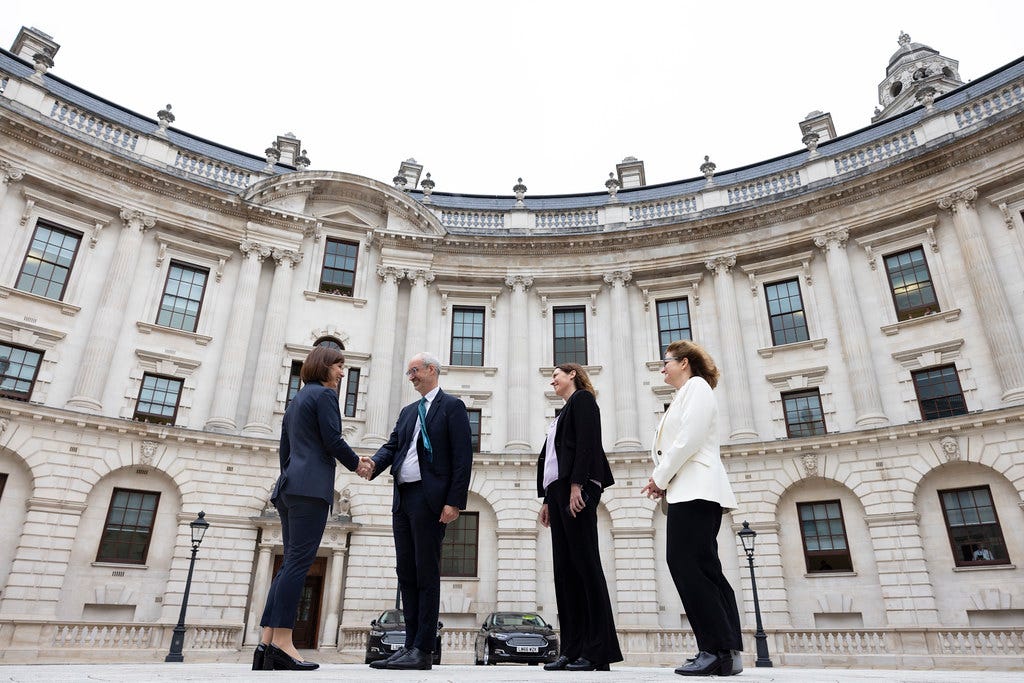The forever war at the heart of government
Britain’s real battle isn’t Labour vs Conservative. It’s Treasury vs Home Office. And it’s a fight no election can end
In early 1979, James Callaghan did what every frustrated prime minister does: he considered splitting the Treasury in two. As told by the great historian of government, Peter Hennessy, in his book, Reflections, the plan was that if Labour won the upcoming election, Roy Hattersley would inherit one half of the department and David Owen the other. “Which part would you like?” the prime minister asked Hattersley, who replied: “The part that’s called chancellor of the exchequer.”1
The UK is unusual in having such a powerful finance ministry. HM Treasury (even its name suggests an element of grandeur) is responsible for managing public spending, strategic oversight of the tax system, financial services policy, fiscal stability, the delivery of infrastructure projects across the public sector and ensuring the economy is growing sustainably. That is rather a lot.
The argument in favour of a Velvet Divorce is that it would enable the government to have a department solely focused on boosting growth. Commentators love to criticise so-called ‘Treasury brain’ – that is, a ministry that knows the price of everything but the value of nothing, dedicated to bean counting while the public realm atrophies and living standards stagnate.
I happen not to be fully persuaded by this argument. Without going full Institute for Government, machinery of government changes are highly disruptive and rarely produce the outcomes ministers desire2. Moreover, there is reason to doubt that some sort of war of Treasury succession will magically connect the great cities of the north of England by high-speed rail or lead to mass housebuilding in the south. Britain will still be Britain.
But there is another reason to keep the status quo. Any diminution of Treasury power would simply leave the Home Office in charge, and that would be a disaster. It is akin to the only half-joking reason why Britain must maintain its independent nuclear deterrent. Not to counter the Russians, but because we could not possibly leave the French as the sole nuclear power in Europe.
The great battle of British politics is not Labour versus Conservative, but Treasury versus Home Office. This fight takes place no matter who is in government, and it is never more vicious than on the subject of immigration. The chancellor tends to favour higher migration, as a means of boosting economic growth and the labour supply. The home secretary tends to oppose it, in favour of controlling borders. On this, Rachel Reeves and Yvette Cooper are playing their roles to perfection.
Reeves is in charge of Labour’s number one priority: securing economic growth. But Cooper is responsible for the other number one priority: cutting net migration. Clearly, they cannot both win. The vacillating over a youth mobility scheme3 with the European Union is instructive. This scheme would enable 18-30 year-olds to work and/or study for a set period of time.
It is broadly popular. A poll by More in Common last year found that 58% of people thought this would be a good idea, compared with 10% who thought it was a bad idea. Yet ministers have been wary of such an agreement. This is partly financial – the European Commission has proposed that the scheme would grant equal treatment of UK and EU students with regard to university tuition fees. But it is also about the domestic politics surrounding net migration.
Such concerns may dictate that any youth mobility deal will be for a period of less than 12 months, rather than the four years that the Commission initially proposed. Why? The technicality that any non-UK national who stays longer than 12 months must be included in net migration figures. And this government is focused not just on “smashing the gangs” who facilitate illegal and dangerous Channel crossings, but on reducing net migration, a focus unlikely to be diminished by Reform UK’s anticipated gains at this week’s local elections.
There are quirks at the margins which may explain the chasm between the home secretary and chancellor. Cooper faces a significant Reform UK threat in her seat, while Reeves is a one-time supporter of a so-called People’s Vote. But it does not really matter. As Jacques puts it in William Shakespeare’s As You Like It:
All the world's a stage,
And all the men and women merely players;
They have their exits and their entrances,
And one man in his time plays many parts.
Cooper and Reeves are merely playing their own parts. And so the war must go on.
I’m indebted to Patrick Kidd of The Times for setting me straight, as I had initially believed this had been a conversation between Hattersley and Neil Kinnock
I kid, but do seek out this excellent Institute for Government report on how to handle machinery of government changes well
The UK already has youth mobility schemes open to people from 12 different nations, including Australia, New Zealand, South Korea, Iceland and Uruguay






The problem with i mmigration is the 'debate' tends to focus on the Farage misinfomation and the short term totally ignoring structural, long term problems.